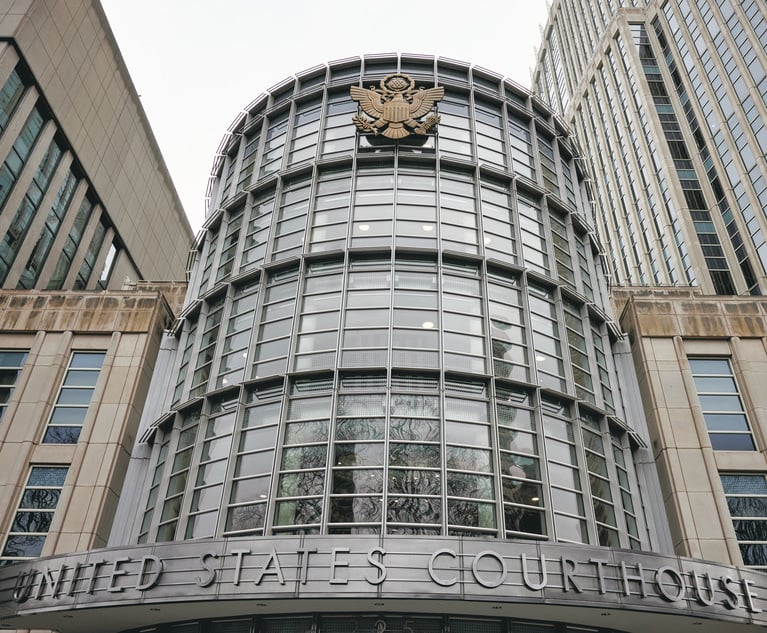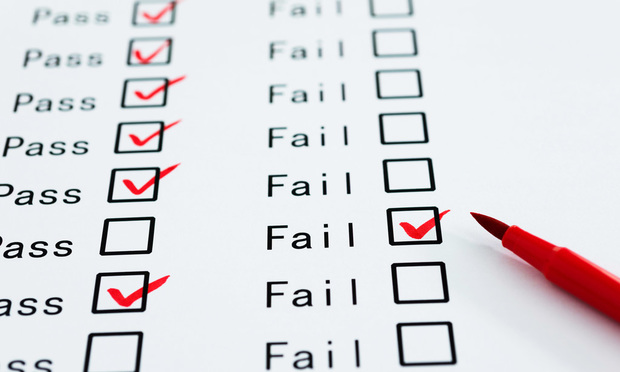Pass/Fail Grading in Law School Gets Mixed Marks From Students
In addition to being split on pass/fail grading, most recent law graduates said in a new survey that law schools should return to normal grading when the pandemic subsides.
June 17, 2020 at 12:20 PM
3 minute read
The original version of this story was published on Law.com
Recent law school graduates are split on whether the swift transition to pass/fail grades at most law campuses amid the COVID-19 pandemic this spring was a good move.
Among the nearly 200 law grads recently polled by Kaplan Test Prep, 48% said they supported pass/fail grading, while 41% said they opposed it. The remaining 11% were undecided about the change.
When COVID-19 forced law schools to quickly move online in late March and early April, the majority adopted mandatory pass/fail grading or gave students the option to have their grades issued as pass/fail. Law school administrators reasoned that the simplified grading scheme would reduce some of the pressure and anxiety law students were feeling at a time of uncertainty, and would level the playing field for students who were attending class and studying under challenging conditions.
"These are unparalleled times for everyone and legal education certainly isn't immune from changes that were once unthinkable just six months ago," said Tammi Rice, vice president of Kaplan's bar prep programs. "It's quite understandable that law schools have moved to pass/fail grading on a temporary basis since students are already stressed out enough thinking about how to stay healthy, securing a job, and prepare for the bar exam. Combining that with the naturally hyper competitive nature of law school could add to that stress, adversely affecting students' mental health."
In some cases, student groups pushed administrators to adopt pass/fail grading or make it mandatory, though such efforts met with opposition from others who wished to maintain traditional grading systems. Pass/fail grading hinders the ability of students to improve their grade-point average and class rank, and may confuse employers who consider grades in hiring, argued students who wished to maintain traditional grades. That division is reflected in the new survey data from Kaplan, which was collected from law graduates now studying for the bar exam.
Among the survey respondents, 63% opposed maintaining pass/fail grading after the pandemic, while 25% said it should remain. Another 12% were unsure. There are already indications that law schools will return to their traditional grading schemes in the fall. Harvard Law School announced in early June that it will remain fully remote in the fall but that it will return to its normal grading system.
"It's highly unlikely pass/fail grading will be maintained once the pandemic subsides," Rice said. "Students who are looking to work for top law firms or secure prestigious internships know that high grades help differentiate them from others vying for those same positions and most are loath to give that up."
This content has been archived. It is available through our partners, LexisNexis® and Bloomberg Law.
To view this content, please continue to their sites.
Not a Lexis Subscriber?
Subscribe Now
Not a Bloomberg Law Subscriber?
Subscribe Now
NOT FOR REPRINT
© 2025 ALM Global, LLC, All Rights Reserved. Request academic re-use from www.copyright.com. All other uses, submit a request to [email protected]. For more information visit Asset & Logo Licensing.
You Might Like
View All
The Met Hires GC of Elite University as Next Legal Chief

NY Appellate Panel Cites Student's Disciplinary History While Sending Negligence Claim Against School District to Trial

'No Evidence'?: Big Law Firms Defend Academic Publishers in EDNY Antitrust Case
3 minute read
'Substantive Deficiencies': Judge Grants Big Law Motion Dismissing Ivy League Price-Fixing Claims
3 minute readTrending Stories
- 1Eighth Circuit Determines No Standing for Website User Concerned With Privacy Who Challenged Session-Replay Technology
- 2Superior Court Re-examines Death of a Party Pending a Divorce Action
- 3Chicago Law Requiring Women, Minority Ownership Stake in Casinos Is Unconstitutional, New Suit Claims
- 4GOP Now Holds FTC Gavel, but Dems Signal They'll Be a Rowdy Minority
- 5Houston-Based Law Firm Overcomes Defamation Suit for Website Warning
Who Got The Work
J. Brugh Lower of Gibbons has entered an appearance for industrial equipment supplier Devco Corporation in a pending trademark infringement lawsuit. The suit, accusing the defendant of selling knock-off Graco products, was filed Dec. 18 in New Jersey District Court by Rivkin Radler on behalf of Graco Inc. and Graco Minnesota. The case, assigned to U.S. District Judge Zahid N. Quraishi, is 3:24-cv-11294, Graco Inc. et al v. Devco Corporation.
Who Got The Work
Rebecca Maller-Stein and Kent A. Yalowitz of Arnold & Porter Kaye Scholer have entered their appearances for Hanaco Venture Capital and its executives, Lior Prosor and David Frankel, in a pending securities lawsuit. The action, filed on Dec. 24 in New York Southern District Court by Zell, Aron & Co. on behalf of Goldeneye Advisors, accuses the defendants of negligently and fraudulently managing the plaintiff's $1 million investment. The case, assigned to U.S. District Judge Vernon S. Broderick, is 1:24-cv-09918, Goldeneye Advisors, LLC v. Hanaco Venture Capital, Ltd. et al.
Who Got The Work
Attorneys from A&O Shearman has stepped in as defense counsel for Toronto-Dominion Bank and other defendants in a pending securities class action. The suit, filed Dec. 11 in New York Southern District Court by Bleichmar Fonti & Auld, accuses the defendants of concealing the bank's 'pervasive' deficiencies in regards to its compliance with the Bank Secrecy Act and the quality of its anti-money laundering controls. The case, assigned to U.S. District Judge Arun Subramanian, is 1:24-cv-09445, Gonzalez v. The Toronto-Dominion Bank et al.
Who Got The Work
Crown Castle International, a Pennsylvania company providing shared communications infrastructure, has turned to Luke D. Wolf of Gordon Rees Scully Mansukhani to fend off a pending breach-of-contract lawsuit. The court action, filed Nov. 25 in Michigan Eastern District Court by Hooper Hathaway PC on behalf of The Town Residences LLC, accuses Crown Castle of failing to transfer approximately $30,000 in utility payments from T-Mobile in breach of a roof-top lease and assignment agreement. The case, assigned to U.S. District Judge Susan K. Declercq, is 2:24-cv-13131, The Town Residences LLC v. T-Mobile US, Inc. et al.
Who Got The Work
Wilfred P. Coronato and Daniel M. Schwartz of McCarter & English have stepped in as defense counsel to Electrolux Home Products Inc. in a pending product liability lawsuit. The court action, filed Nov. 26 in New York Eastern District Court by Poulos Lopiccolo PC and Nagel Rice LLP on behalf of David Stern, alleges that the defendant's refrigerators’ drawers and shelving repeatedly break and fall apart within months after purchase. The case, assigned to U.S. District Judge Joan M. Azrack, is 2:24-cv-08204, Stern v. Electrolux Home Products, Inc.
Featured Firms
Law Offices of Gary Martin Hays & Associates, P.C.
(470) 294-1674
Law Offices of Mark E. Salomone
(857) 444-6468
Smith & Hassler
(713) 739-1250







